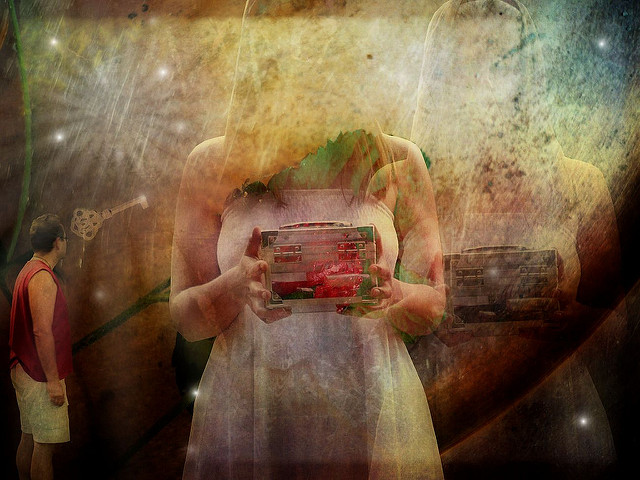
“Very little is needed to make a happy life; it is all within yourself, in your way of thinking.”
~ Marcus Aurelius
“When one door of happiness closes, another opens… but often we look so long at the closed door, that we do not see the one which has been opened for us.”
~ Anne Frank
~
We are all caught in the maze of chasing fame and fortune and, of course, power, in whatever form we can attain it in the delusive hope that it will provide us lasting and wholesome happiness.
We see hordes of people who seem to have it all—money, fame, houses, cars, yet who are miserable at heart, whose lives are devoid of the peace and contentment that all this was expected to bring.
Fortunately happiness does not rest in anyone’s hands but our own. Happiness is not found over the rainbow or in some mythical place. It’s around the corner, dancing down the street with no cares in the world.
Looking for happiness through the acquisition of objects is like trying to catch your own shadow. The closer you move toward it, the farther it moves away from you. Plato feels that the happiest life is one in which each part of the soul performs its function with complete excellence, or to the highest degree.
His mentor and teacher Socrates recommended harmonizing the different parts of the soul. Doing so, he believed, would produce a divine-like state of inner tranquility. True to his word, he cheerfully faced his own death, when he took the lethal hemlock.
The problem is that we can so easily be seduced into believing that generating more external value—whether in the form of wealth, status or even achievement—leads to a greater sense of internal value. Each of these, pursued as a means to ensure our value, delivers diminishing returns over time.
Psychologists explain that what is essential is an engagement with something that gives meaning and purpose to one’s life; that is the real ingredient for building happiness. In the words of Carl Jung, “The least of things with a meaning is worth more in life than the greatest of things without it.”
The idea of happiness is not a human universal that applies across all times and all cultures, but something that remains fluid through the eons. There is, however, overwhelming agreement that the texture of the lives of all happy people shows that they connect very well with the world around them and have a purpose to their lives which buffers them from the mart of worldly strife. “Life has meaning,” as Robert Browning reminds us, and “to find its meaning is my meat and drink.” These happy people are like Mitya in The Brothers Karamazov, “One of those who don’t want millions, but an answer to his questions.”
Sadly, most of us have lost focus of this age old equation and are pursuing a mirage––the conquest of the material world. Nathaniel Hawthorne rightly said that, “Happiness is as a butterfly which, when pursued, is always beyond our grasp, but which if you will sit down quietly, may alight upon you.”
Any single-minded pursuit, unmoored to a deeper purpose, has the potential to take on the characteristics of an addiction. More and more is required to obtain the same high, and the compulsion of the pursuit prompts a growing sense of despair and unworthiness it is meant to solve.
The essence of happiness lies in contentment. Contentment is not possible by expanding or shrinking the limitless expanse of this beautiful universe. It has to be cultivated in our hearts and minds. It cannot be sought in the world around us; it has to be discovered in one’s inward self. For in many cases, the wealthiest classes of people may be the least contented and the poorest ones may be the ones most contended. Contentment has no relation with human needs. On the contrary, needs become defined by it.
It is the duty of parents and teachers to teach children to develop the right template for happiness and then equip it with a moral compass that can keep the template intact. A most ideal template is one that that has all these ingredients—sensitivity to the feelings and needs of others and skills that are best learned early—notably: empathy, responsibility, kindness, reciprocity, generosity, and the value of fairness.
John Rockefeller reiterates these same values: ”The road to happiness lies in two simple principles…find what it is that interests you and you can do well, and when you find it, put your whole soul into it, every bit of energy and ambition and natural ability you have.” To pursue the happiness within our reach, we must do best to pour ourselves into faith, family, community and meaningful work. Happiness can be woven into every aspect of life, once you make new choices.
There is a very interesting story which teaches us how happiness doesn’t have any relation with our social position. A philosopher was being rowed across a river by a boatman when the philosopher asked him, “Do you have any idea of the stars and the moon and their secret? What influence do they have on our destinies?” The boatman replied, “None whatever. The stars shine in God’s will and do the job assigned to them. They look beautiful and I can neither make them nor break them. I am only wonderstruck by the glory of God who made them and placed them where they are.”
With a deep sigh, the philosopher remarked, “Then you have wasted one fourth of your life.” A little later, the philosopher whispered, “Do you know the history of your kings and queens?” The boatman became irked by the meaningless quizzing. He scornfully answered, “I do not have to know the kings and queens, who come and go, but God remains and He is merciful to me. So why should I bother about those who come to revel in affluence and luxury and bother least about the pain of we poor?”
The philosopher sighed, “Then you have wasted one half of your life.” The philosopher then asked, “Do you know the nature of God? Who is He? Where does He abide? How does He look like?” The boatman was already losing his nerve. “No, sir, I don’t know. I know God is, and it is He who does whatever happens to me and to you, and He’s merciful and kind and punishes the evil. There’s nothing more I need to know about him. I sleep better by passing on all my cares to Him,” he sniggered.
The philosopher had a great laugh and exclaimed with sarcasm, “Then, O fool, you’ve wasted three-fourths of your life.” After some time, the river was in storm and the boat started rocking and tossing about. The philosopher was mortified and started panicking. It was now the turn of the boatman to mock the philosopher. “Sir, why are terrified? Don’t you know swimming?” The philosopher moaned, “No” and lapsed into a swoon. The boatman had the last laugh. “In that case, sir, you have wasted all your life.” The boatman had a simple faith, was happy and contented with his simple life. He was gifted with a virtue that eludes many during their lifetime.
We should take joy in our freedom while at the same time ensuring that we do don’t infringe on the freedom of others. We can all generate our own good feelings by the way we react to what is around us. In the words of Eleanor Roosevelt, “Happiness is not a goal; it’s a by-product of a life well lived.”
The German philosopher Arthur Schopenhauer said, “It is difficult to find happiness within but it is impossible to find it anywhere else.” Looking for happiness through the acquisition of objects is like trying to catch your own shadow. The closer you move toward it, the further it recedes. All one has to do is catch hold of one’s self and the shadow will be caught. Happiness will abide with us only when we confer it on others. Happiness comes not from getting something but from giving and serving. It comes almost as a kind of benediction on the full, caring, loving and interested life. It can never be had by seeking.
Gloom sets in when our conscience is stained by desires and impressions of wordiness. It needs to be polished by a deep journey inward. A successful journey opens our spiritual eye to the wonders we have been gifted with. Instead of comparing ourselves constantly with “the haves” and feeling deprived, we start weighing our good fortunes against those who have little. Fyodor Dostoyevsky emphasized the same point: “Man only likes to count his troubles; he doesn’t calculate his happiness.”
We are lost in a world of delusion and attachment, too caught up to reflect upon the words of these wiser souls. They spoke out of their divine experience to awaken us from our slumber. It is our duty to use these pearls of wisdom to discover that inner happiness. Instead of comparing ourselves constantly with “the haves” and feeling somehow cheated and deprived, it would do us a world of good to weigh our good fortunes against those who have little. Our time on this earth is not infinite. We need to welcome any opportunity to smile and can’t afford to waste one second. There’s real purpose in our desire for happiness—it’s not selfish to pursue it.
Socrates used to walk in affluent streets and gaze at the windows of luxurious shops. When asked by a passer-by why he repeatedly did so when he did not even have decent clothes, he went on to say that he did it to remind himself of how happy he was despite not having any of those things.
We must abandon this delusion of selfhood and the ignorant cravings that go with it. Buddha specified them: “Craving for the gratification of the passions, craving for a future life, craving for success in this life.”
We must learn through love to get subsumed in the world and be a humble part of it. It is through such an engagement with one’s self, the world and reality that one is able to achieve a transcendental happiness.
As Oliver Wendell Holmes emphasizes, ”Love is the master key that opens the gates of happiness.”
Let us let go of all the those negative emotions generated on account of past frustrations and look to every new day with the heart of a virgin’s soul, so that we not only make life happier for ourselves but also create positive ripples for people around us. It helps building self sustaining cycle of eternal bliss.
~
~
~
Author: Moin Qazi
Image: Flickr/Eddi van W.
Editor: Travis May


 Share on bsky
Share on bsky




Read 0 comments and reply